This article needs additional citations for verification. (June 2010) |
Honeybees usually collect nectar, pollen, or both from the following species of plants, which are called honey plants, for making honey.

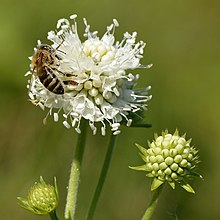



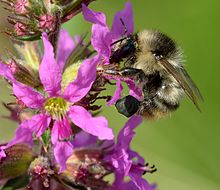

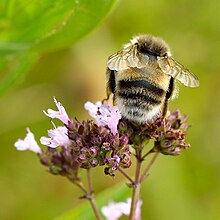



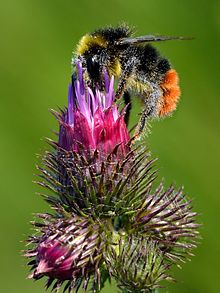
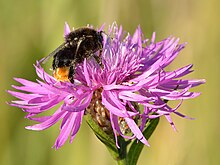



Acanthaceae (Acanthus family)
edit- Avicennia nitida Jacq. or Avicennia germinans (Black mangrove)
Aceraceae (Sapindaceae) (Maple family)
edit- Acer rubrum L. (Red maple)
- Acer saccharinum L. (Sugar maple)
- Acer spicatum Lam. (Mountain maple)
- Acer pseudoplatanus L. (Sycamore maple)
- Agave sisalana Perrine ex Engelm. (Sisal)
Amaranthaceae (Amaranth family)
editAmaryllidaceae (Amaryllis family)
edit- Anacardium occidentale L.
- Anacardium humile A.St.-Hil.
- Astronium fraxinifolium Schott
- Lithraea molleoides Engl.
- Mangifera indica L.
- Myracrodruon urundeuva M.Allemão
- Schinus molle L.
- Schinus terebinthifolius Raddi
- Schinopsis brasiliensis Engl.
- Spondias lutea L.
- Spondias mombin L.
- Spondias tuberosa Arruda
- Tapirira guianensis Aubl.
- Tapirira marchandii Engl.
Apocynaceae (Dogbane family)
editAll the plants of this family are found in the tropics and subtropics.
- Aspidosperma cylindrocarpon Müll.Arg.
- Aspidosperma dasycarpon A.DC.
- Aspidosperma macrocarpon Mart.
- Aspidosperma parvifolium A.DC.
- Aspidosperma polyneuron A.DC.
- Aspidosperma pruinosum Markgr.
- Aspidosperma pyrifolium Mart., syn. Aspidosperma populifolium A.DC.
- Hancornia speciosa Gomes
- Peschiera affinis Miers
- Rhodocalyx rotundifolia Müll.Arg.
- Tabernaemontana fuchsiaefolia A.DC.
Aquifoliaceae (Holly family)
editAraliaceae (Aralia and ivy family)
edit- Acrocomia aculeata Lodd. ex Mart.
- Attalea speciosa Mart.
- Roystonea elata (Bartr.) F.Harper
- Sabal palmetto Lodd. ex Schult.f.
- Syagrus romanzoffiana (Cham.) Glassman (= Cocos romanzoffiana Cham., or Arecastrum romanzoffianum (Cham.) Becc.).
- Trithrinax campestris (Burmeist.) Drude & Griseb.
Asteraceae (Aster, daisy, sunflower family)
edit- Ambrosia polystachya DC.
- Baccharis dracunculifolia DC.
- Baccharis genistelloides Pers.
- Baccharis gracilis DC.
- Baccharis halimifolia L.
- Baccharis ligustrina DC.
- Baccharis platypoda DC.
- Baccharis punctulata DC.
- Baccharis serrula Sch.Bip.
- Baccharis sessifolia L.
- Baccharis tridentata Vahl
- Bidens cernua L.
- Bidens pilosa L.
- Cichorium intybus L.
- Cirsium arvense (L.) Scop. (= Carduus arvensis, or Cirsium incanum)
- Cirsium vulgare (Savi) Ten. (= Carduus vulgaris, Carduus lanceolatus, or Cirsium lanceolatum)
- Centaurea biebersteinii (Jaub. et Spach) Walp.
- Centratherum punctatum Cass.
- Cosmos sulphureus Cav.
- Echinops sphaerocephalus L.
- Eremanthus sphaerocephalus Baker
- Eupatorium itatiayense Hieron.
- Eupatorium maculatum L.
- Eupatorium maximiliani Schrad. ex DC.
- Eupatorium purpureum L.
- Eupatorium squalidum DC.
- Helianthus annuus L. (Sunflower)
- Helianthus tuberosus L. (Jerusalem artichoke)
- Inula magnifica Lipsky
- Karelinia caspia (Pall.) Less.
- Liatris spicata Willd.
- Mikania cordifolia Willd.
- Mikania hirsutissima DC.
- Mikania microphylla Sch.Bip. ex Baker
- Mikania speciosa DC.
- Mikania sessilifolia DC.
- Moquinia polymorpha DC.
- Oligoneuron rigidum Small (= Solidago rigida L.)
- Piptocarpha notata Baker
- Piptocarpha rotundifolia Baker
- Rudbeckia spp. L.
- Sonchus arvensis L.
- Senecio brasiliensis Less.
- Solidago chilensis Meyen
- Symphyotrichum novae-angliae (L.) G.L.Nesom
- Taraxacum officinale Weber
- Trichogonia salviaefolia Gardner
- Trixis antimenorrhoea Mart. ex Baker
- Verbesina alternifolia Britton ex Kearney
- Vernonia apiculata Mart. ex DC.
- Vernonia argyrophylla Less.
- Vernonia diffusa Less.
- Vernonia herbacea Rusby
- Vernonia lacunosa Mart. ex DC.
- Vernonia linearis D.Don ex Hook. et Arn.
- Vernonia patens Kunth
- Vernonia polyanthes Less.
- Vernonia scorpioides Pers.
- Vernonia virgata Gagnep.
- Zinnia multiflora L.
Bignoniaceae (Trumpet creeper family)
editAll the plants of this family are found mostly in the tropics or subtropics.
- Campsis radicans Seem. (= Bignonia radicans, or Tecoma radicans)
- Catalpa bignonioides Walter
- Catalpa speciosa Warder ex Engelm.
- Cybistax antisyphilitica (Mart.) Mart.
- Handroanthus albus
- Handroanthus impetiginosus
- Jacaranda brasiliana Pers.
- Jacaranda caroba Hort. ex Lem.
- Jacaranda decurrens Cham.
- Jacaranda paucifoliolata Mart. ex DC.
- Memora glaberrima K.Schum.
- Memora nodosa Miers
- Podranea ricasoliana (Tanfani) T. Sprague
- Pyrostegia ignea Presl
- Pyrostegia venusta Miers
- Tabebuia aurea
- Tabebuia chrysotricha
- Tabebuia heptaphylla (Vell.) Toledo
- Tabebuia ochracea
- Tabebuia rosea (Bertol.) DC.
- Tabebuia roseo-alba
- Tabebuia serratifolia
- Tabebuia vellosoi Toledo
- Zeyheria digitalis (Vell.) Hoehne et Kuhlm.
Bombacaceae (see also Malva family)
editBoraginaceae (Borage or Forget-me-not family)
edit- Anchusa strigosa Banks & Sol.[1]
- Auxemma glazioviana Taub.
- Auxemma oncocalyx Taub.
- Borago officinalis L.[1]
- Cerinthe major L.
- Cordi alliodora Cham.
- Cordia campestris Warm.
- Cordia corymbosa G.Don
- Cordia hypoleuca DC.
- Cordia insignis Cham.
- Cordia leucocephala Moric.
- Cordia nodosa Lam.
- Cordia trichotoma (Vell.) Steud.
- Cordia verbenacea DC.
- Echium plantagineum L.
- Echium simplex DC.
- Echium virescens DC.
- Echium wildpretii H.Pearson ex Hook.f.
- Symphytum brachycalyx Boiss.[1]
- Phacelia tanacetifolia Benth.
- Patagonula americana L.
Brassicaceae (Mustard family or cabbage family)
edit- Apuleia molaris Spruce ex Benth.
- Bauhinia forficata Link
- Cassia ferruginea (Schrad.) DC.
- Cassia grandis L.f.
- Caesalpinia echinata Lam.
- Caesalpinia ferrea Mart.
- Caesalpinia peltophoroides Benth.
- Caesalpinia pyramidalis Tul.
- Caesalpinia microphylla Mart.
- Copaifera langsdorffii Desf.
- Copaifera oblongifolia Mart. ex Hayne
- Delonix regia Raf.
- Hymenaea courbaril var. stilbocarpa (Hayne) Y.T.Lee et Langenh.
- Schizolobium parahyba (Vell.) Blake
- Schotia brachypetala Sond.
- Sclerolobium aureum Baill.
- Sclerolobium paniculatum Vogel
- Senna martiana (Benth.) H.S.Irwin et Barneby
- Senna multijuga (Rich.) H.S.Irwin et Barneby
- Senna speciosa Roxb.
- Senna splendida (Vogel) H.S.Irwin et Barneby
Cannabaceae (Hemp Family)
editCapparaceae (Caper family)
editCaprifoliaceae (Honeysuckle family)
editAll the plants of this family are found only in the neotropics.
Caryophyllaceae (Carnation family)
editCelastraceae (staff vine or bittersweet family)
editfound in tropics or sub-tropics
Convolvulaceae (Bindweed or morning glory family)
editCucurbitaceae (Melon, cucumber, calabash, squash family)
editErythroxylaceae (Coca family)
editEuphorbiaceae (Spurge family)
edit- Alchornea iricurana Casar.
- Alchornea triplinervia (Spreng.) Müll.Arg.
- Aleurites fordii Hemsl.
- Croton floribundus Spreng.
- Croton macrobothrys Baill.
- Croton salutaris Casar.
- Dalechampia humilis Müll.Arg.
- Euphorbia mellifera Seub.
- Euphorbia pulcherrima Willd. ex Klotzsch
- Julocroton triqueter Baill.
- Phyllanthus acidus (L.) Skeels
- Ricinus communis L.
- Sapium sebiferum (L.) Roxb.
- Andira inermis (Wright) DC.
- Amburana cearensis (= Torresea cearensis M.Allemão) (M.Allemão) A.C.Smith
- Centrolobium robustum Mart. ex Benth.
- Gliricidia sepium (Jacq.) Steud
- Geoffraea spinosa Jacq.
- Machaerium acutifolium Vogel
- Machaerium scleroxylon Tul.
- Medicago sativa L.
- Melilotus alba Medik.
- Melilotus officinalis Lam.
- Myrocarpus frondosus M.Allemão
- Sweetia fruticosa var. fruticosa Spreng. (= Ferreirea spectabilis M.Allemão)
- Trifolium pratense L.
- Trifolium repens L.
- Agastache foeniculum Kuntze
- Agastache nepetoides
- Eriope crassipes Benth.
- Hyptis brevipes Poit.
- Hyptis cana Pohl ex Benth.
- Hyptis nudicaulis Benth.
- Hyptis suaveolens Poit.
- Hyptis umbrosa Salzm. ex Benth.
- Lavandula spp. L.
- Leonurus cardiaca L.
- Leonurus sibiricus L.
- Monarda didyma L.
- Monarda fistulosa L.
- Nepeta cataria L.
- Nepeta × faassenii
- Nepeta mussinii Spreng. ex Henckel
- Nepeta siberica (= Nepeta macrantha, Dracocephalum sibiricum)
- Pycnanthemum tenuifolium Schrad.
- Pycnanthemum verticillatum Pursh var. pilosum (Nutt.) T.S.Cooperrider
- Pycnanthemum virginianum Trel. ex Branner et Coville
- Salvia splendens Ker Gawl.
- Satureja thymbra L.[1]
- Stachys byzantina K.Koch
- Thymbra spicata L.[1]
- Thymus capitatus (L.) Hoffmanns. & Link[2]
- Thymus serpyllum L.
- Vitex sellowiana Cham.
Magnoliaceae (Magnolia and tulip tree family)
editAll the plants of this family are found in the neotropics.
- Banisteriopsis campestris (A.Juss.) Little
- Banisteriopsis clausseniana (A.Juss.) W.R.Anderson et B.Gates
- Banisteriopsis gardneriana (A.Juss.) W.R.Anderson et B.Gates
- Banisteriopsis pubipetala (Juss) Cuatrec.
- Byrsonima crassa Nied.
- Byrsonima crassifolia L.Rich
- Byrsonima coccolobifolia Kunth
- Byrsonima intermedia A.Juss.
- Byrsonima subterranea Brade et Markgr.
- Byrsonima verbascifolia Rich. ex Juss.
- Heteropteris aceroides Griseb.
- Acacia farnesiana (L.) Willd.
- Acacia paniculata Willd.
- Acacia plumosa Mart. ex Colla
- Albizia polyantha (Spreng.f.) G.P.Lewis (= Pithecelobium multiflorum (Kunth) Benth.)
- Albizia polycephala (Benth.) Killip ex Record (= Pithecellobium polycephalum Benth.)
- Anadenanthera colubrina (Vell.) Brenan var. cebil (Griseb.) Altschul (= Anadenanthera macrocarpa (Benth.) Brean)
- Anadenanthera contorta (Benth.) Brenan
- Anadenanthera falcata Speg. (= Piptadenia falcata Benth.)
- Anadenanthera peregrina Speg.
- Calliandra dysantha Benth.
- Enterolobium contortisiliquum (Vell.) Morong
- Enterolobium gummiferum (Mart.) Macbride
- Inga affinis DC.
- Inga edulis Mart.
- Inga marginata Willd.
- Inga paterno Harms
- Inga sessilis Mart.
- Leucaena glauca Benth.
- Mimosa acutistipula Benth.
- Mimosa bimucronata Kuntze
- Mimosa caesalpiniaefolia Benth.
- Mimosa laticifera Rizzini et N.F.Mattos
- Mimosa multipinna Benth.
- Piptadenia gonoacantha Benth.
- Piptadenia paniculata Benth.
- Pithecolobium avaremotemo Mart.
- Pithecolobium diversifolium Benth.
- Pithecolobium dumosum Benth. (= Chloroleucon dumosum (Benth.) G.P.Lewis)
- Pithecellobium inopinatum (Harms) Ducke
- Stryphnodendron adstringens (Mart.) Coville
- Stryphnodendron obovatum Benth.
- Rapanea ferruginea Mez (= Caballeria ferruginea Ruiz et Pav.)
- Rapanea lancifolia Mez
- Rapanea umbellata Mez
- Amomyrtus meli (Phil.) D.Legrand & Kausel
- Campomanesia adamantium Blume
- Campomanesia crenata O.Berg
- Campomanesia guazumaefolia Blume
- Campomanesia pubescens O.Berg
- Campomanesia xanthocarpa O.Berg
- Corymbia citriodora (Hook.) K.D. Hill & L.A. Johnson
- Genus Eucalyptus L'Her., especially the following species:
- Eucalyptus alba;
- Eucalyptus camaldulensis;
- Eucalyptus citriodora;
- Eucalyptus corymbosa;
- Eucalyptus drepanophylla;
- Eucalyptus globulus;
- Eucalyptus maculata;
- Eucalyptus melliodora;
- Eucalyptus microcorys;
- Eucalyptus oleosa;
- Eucalyptus paniculata;
- Eucalyptus citriodora;
- Eucalyptus redunca;
- Eucalyptus scabra;
- Eucalyptus tereticornis;
- Eucalyptus triantha;
- Eucalyptus wandoo.
- Eugenia brasiliensis Lam.
- Eugenia caryophyllata Thunb. (= Syzygium aromaticum (L.) Merr. et Perry)
- Eugenia convexinervia D.Legrand
- Eugenia dombeyana DC.
- Eugenia dysenterica DC.
- Eugenia hyemalis Cambess.
- Eugenia multicostata D.Legrand
- Eugenia pyriformis Cambess.
- Eugenia uniflora L.
- Myrceugenia euosma (O.Berg) D.Legrand
- Myrcia rostrata DC.
- Myrciaria cauliflora (Mart.) O.Berg
- Myrciaria glomerata O.Berg
- Leptospermum scoparium J.R.Forst. & G.Forst.
- Luma apiculata (DC.) Burret
- Metrosideros umbellata Cav.
- Psidium araca Raddi
- Psidium cinereum Mart. ex DC.
- Psidium firmum O.Berg
- Psidium guajava L.
- Antigonon leptopus — Hook. et Arn.
- Eriogonum fasciculatum— Benth.
- Eriogonum giganteum — S.Wats.
- Fagopyrum esculentum (buckwheat) — Moench
- Fagopyrum sagittatum — Gilib.
- Polygonum punctatum — Raf.
- Reynoutria japonica (syn. Polygonum cuspidatum) – Japanese knotweed
Passifloraceae (Passion flower family)
edit- Banksia integrifolia L.f.
- Banksia sessilis (Knight) A.R.Mast & K.R.Thiele
- Gevuina (Molina) Gaertn.
- Grevillea banksii R.Br.
- Grevillea robusta A.Cunn. ex R.Br.
- Grevillea rosmarinifolia A.Cunn.
- Grevillea thelemanniana Hueg.
- Protea repens
- Protea cynaroides
- Roupala brasiliensis Klotzsch
- Roupala cataractarum Sleumer
- Roupala heterophylla hl
- Roupala montana Willd.
- Roupala tomentosa Pohl
- Knightia excelsa R. Br.
Rhamnaceae (Buckthorn family)
edit- Murraya paniculata (L.) Jack
Salicaceae (Willow and poplar family)
edit- Salix amygdaloides Andersson
- Salix bebbiana Sarg.
- Salix caprea L.
- Salix discolor Muhl.
- Salix nigra Marshall
- Banara parviflora Benth.
- Casearia decandra Jacq.
- Casearia sylvestris Sw.
Sapindaceae (Soapberry family)
editSolanaceae (Tomato, potato, egg plant family)
editUrticaceae (Nettle family)
editVerbenaceae (Verbena family)
edit- Aegiphila lhotskiana Cham.
- Aegiphila tomentosa Cham.
- Aloysia virgata (Ruiz et Pav.) Juss. (= Lippia urticoides (Cham.) Steud.)
- Lantana camara L.
- Lantana lilacina Desf.
- Lantana trifolia L.
- Lippia alba N.E.Br. ex Britton et P.Wilson
- Lippia candicans Hayek
- Petrea subserrata Cham.
- Petrea volubilis L.
- Zapania citriodora Lam. (= Lippia citriodora (Lam.) Kunth)
All the plants of this family are found in the neotropics.
See also
edit- Toxic honey plants, whose nectar results in toxic honey
- Forage (honeybee)
- Honeydew source
- Nectar source
- Northern American nectar sources for honey bees
- Pollen source
- Melliferous flower
- Regional honeys
References
edit- ^ a b c d e Dalman, Gustaf (2013). Work and Customs in Palestine. Vol. I/2. Translated by Nadia Abdulhadi Sukhtian. Ramallah: Dar Al Nasher. p. 563. ISBN 9789950385-01-6. OCLC 1040774903.
- ^ Dalman, Gustaf (2013). Work and Customs in Palestine. Vol. I/2. Translated by Nadia Abdulhadi Sukhtian. Ramallah: Dar Al Nasher. pp. 563–564. ISBN 9789950385-01-6. OCLC 1040774903.
- ^ "Frangula alnus". www.fs.usda.gov. Retrieved 14 January 2024.
- ^ "Plants of Special Value to Honey Bees". www.wildflower.org. Retrieved 14 January 2024.
- ^ "Woollyleaf Ceanothus, Ceanothus tomentosus". calscape.org. Retrieved 14 January 2024.
- (in Portuguese) BRANDÃO, M.; FERREIRA, P. B. D. (1991). Flora Apícola do Cerrado.(Honey flora of Cerrado) Informe Agropecuário 15 (168): 5–7.
- (in Portuguese) CÂNDIDO, F. A. (1992) As árvores e a apicultura. (Trees and beekeeping.) UFV
- Michigan bee plants
- (in Portuguese) WIESE, H. (1993) Nova apicultura. (New beekeeping.) Livraria e Editora Agropecuária
External links
editLook up honey plant in Wiktionary, the free dictionary.
- Beekeeping made easy: honey plants at the Wayback Machine (archived 20 October 2012)
- Honey plants by Connie Krochmal at the Wayback Machine (archived 4 February 2012)